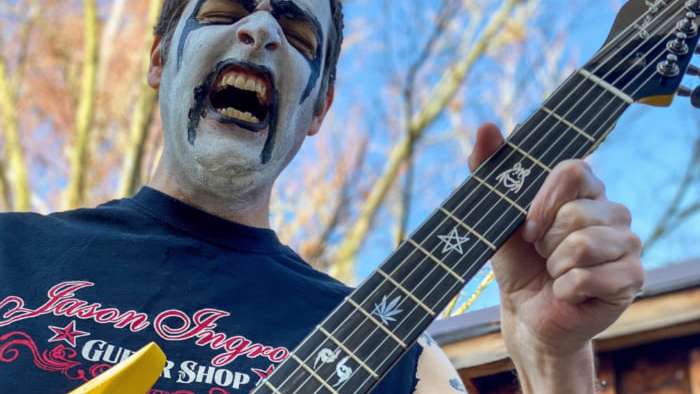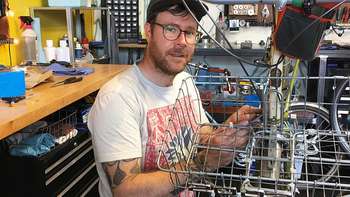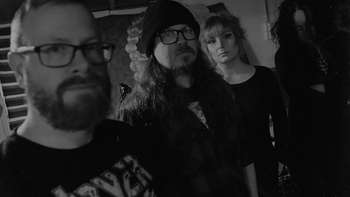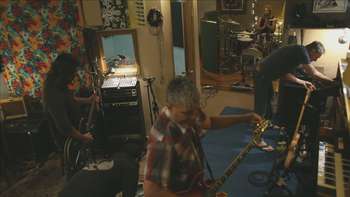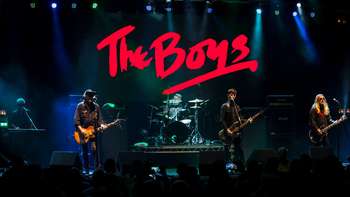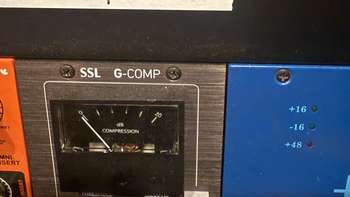There are a lot of misconceptions about the life of a musician. It’s rarely glamorous. Most musicians have day jobs – and not just to pay the bills. Jobs provide new challenges, personal fulfillment and, yes, some rent or gas money. And usually when somebody is writing a new record or scheduling a tour, they have to balance that with their job.
How an artist spends their time by day will influence the creative process at night. In Don’t Quit Your Day Job, Scene Point Blank looks at how musicians split their time, and how their careers influence their music or – sometimes – how their music provides escape.
In this edition, we chat with Grim Deeds, a middle school teacher by day and musician by night. Grim Deeds also runs Laptop Punk Records.
Scene Point Blank: First, can you share a bit about your job title(s) and background? You're a middle school teacher. Do you focus on a specific subject right now?
Grim Deeds: I’ve mostly taught 6th grade Math/Science since 2008. Prior to that I worked in elementary schools as a paraeducator in special education and substitute teacher. I’ve also taught 2 years of 8th grade science and currently teach a 7th grade broadcast journalism elective.
Scene Point Blank: How long have you been doing this? How did you pick the age group and subjects you teach?
Grim Deeds: Both my teaching career and punk music career started in 2006. It took me two years to become a credentialed teacher in California after graduating college with a noneducation degree. I was trained as an elementary school teacher with the expectation of teaching the lower grades, but I ended up getting my first job offer as a 6th grade teacher in middle school and ended up sticking with it. In my first certificated job interview the principal said, “Okay we have a Language Arts/Social Studies position and we have a Math/Science position. Do you want Math/Science?” I said yes without even considering it. Math and Science were actually the subjects I struggled with the most in school but teaching them ended up being great because I’m able to better anticipate the students’ misunderstandings. It’s also kept me on my toes as a professional -- I ended up taking college level algebra and geometry just to make sure I could handle everything that was taught in grades 6-8 at my school.
Scene Point Blank: When did you start teaching? Did you have other professions before that pushed you in this direction?
Grim Deeds: I began teaching in 2006 because I wanted to stop working in retail, which is what I did immediately after college. I worked for Staples the Office Supply Superstore as an associate and then an inventory specialist. It was hard work and not stimulating or interesting to me, so I decided to look into substitute teaching as an alternative. At that point I didn’t even have plans to pursue teaching as a career. When I met my wife, she was already planning to move back to her home in the Bay Area of California. I followed her out to San Francisco and decided to enroll in a credentialing program soon after.
Scene Point Blank: What's the hardest part of working with this age group?
Grim Deeds: In the beginning I was very intimidated by the 7th and 8th graders, because at that age they don’t necessarily care about impressing you or seeking your approval like the 6th graders (the youngest and most impressionable students). Kids are also good at detecting your inexperience and your insecurities, so it took some time for me to build up the confidence to do my job without second-guessing myself. It was also a challenge not to take kids’ behavior personally at first. Eventually I realized that it’s always worthwhile to be kind and respectful to students, even if their behavior doesn’t seem to warrant it. Usually, students who have behavior issues also have other challenges that have nothing to do with me. I’ve taught foster kids, abuse survivors, children of incarcerated parents, depressed students, etc. My main role is to be a positive and supportive adult in their lives. When I began focusing on that, everything got easier and I was able to let my guard down more and more.
Scene Point Blank: What's the most rewarding?
Grim Deeds: The most rewarding part is being able to show the students support in ways that make a lasting impression. I’m still in touch with students I taught over 15 years ago. To see their success and to be able to catch up with them is very rewarding. It’s also an honor to serve families in a supportive and encouraging role. A happy family life is anything but a given, and it feels good to be able to offer a form of stability and routine that’s valued by those students who have hard lives outside of school.
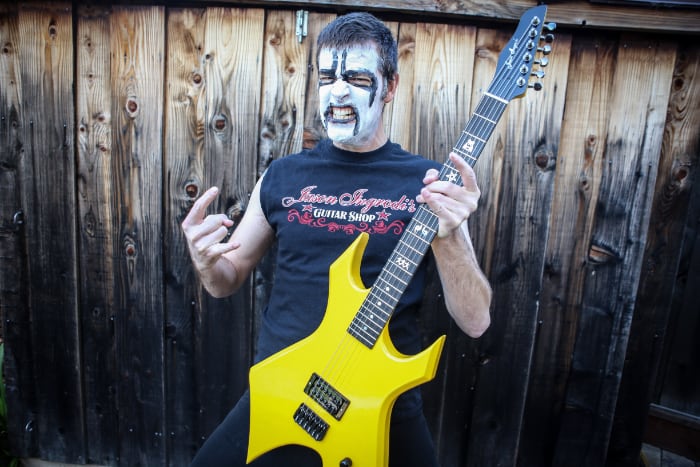
Scene Point Blank: What's the hardest part from a professional perspective: The long hours, working with parents, bureaucracy, or something else?
Grim Deeds: Working with parents and students is the best part of the job in my opinion. Politics and low pay are the most difficult parts. Very few teachers in my area can afford to live where they teach, which is an indignity. The political climate adds stress to an already stressful job, and our societal view of teachers has become more cynical in recent decades. Still, it’s a uniquely fulfilling job and I’m honored to do it.
Scene Point Blank: When did you first become serious about being a musician and, in comparison, when did you start teaching? In other words, do they overlap and was one "established" before the other?
Grim Deeds: Teaching and music began around the same time. I pursued each with focus and passion until I achieved the goals I’d set for myself. At this point I’d consider myself to be seasoned as a teacher and a punk rocker -- 15 years in education and in the underground music scene.
Scene Point Blank: Did playing in bands influence your career choice?
Grim Deeds: No, not necessarily -- but I have observed that teaching has a lot in common with being in a band. The performance aspect is similar, and both are creative endeavors. I’ve met plenty of teachers who are musicians and artists. There’s a definite connection, but I wasn’t really aware of it until later.
Students and parents will Google me from time to time and see Grim Deeds interviews. That can be a challenging conversation to have, because if I’m honest about it then there’s a lot of explaining to do. Sometimes I have denied that it’s me.
Scene Point Blank: Does your music ever come up on the job? (With students or with colleagues?)
Grim Deeds: I don’t talk about it with my colleagues unless I know for a fact that they’re into music more than the average person. One of my fellow teachers is a hip-hop artist so we clicked and shared our respective stories with one another. Otherwise, I don’t bring it up at work. Students and parents will Google me from time to time and see Grim Deeds interviews. That can be a challenging conversation to have, because if I’m honest about it then there’s a lot of explaining to do. Sometimes I have denied that it’s me.
Scene Point Blank: I always liked pop music and stuff as a kid, but it all changed in junior high/middle school. Broadly speaking, are the kids interested in what you do at all? If they know about it, does it make sense to them or are all musicians the same?
Grim Deeds: The kids who have found out about it think it’s cool, but I generally try to change the subject and even tell them flat out that I don’t like talking about it because my teacher role is very different and separate from my role as an artist. Sometimes those conversations make me very anxious, because the precocious ones tend to dig deep into the Grim Deeds archives and find lyrics or photos that are very unbecoming of a middle school teacher without the proper context or explanation. To be honest it’s an ongoing source of anxiety for me. I always trust that the student will move on to something else, though -- and they always have for the most part.
Scene Point Blank: Has a student (or former student) ever given you a demo for the label or showed up at a gig?
Grim Deeds: There have been student musicians who formed their own bands and wrote their own songs. I always offer encouragement and support as much as possible, which is another very rewarding aspect of my job. Some of the students have displayed rare talent for playing or composing music, so it’s cool to be in a position where I can convey that to them and know that they’ll take it seriously and gain confidence from our interactions.
Scene Point Blank: How does the job affect your creative work or schedule with the band? (I imagine it's easier to play shows in the summer, for example.) How does that affect how you write, rehearse or record?
Grim Deeds: I’ve mostly operated as a one-man band and rarely play live, so it’s been a nonissue overall. I’ve recorded a few songs in my classroom during my prep period in the past, but these days I just do all the punk rock stuff at home after my wife and son are asleep. Life is busy, but I’ve always remained productive while prioritizing my career and family.
Scene Point Blank: Has your work influenced any specific songs you've released?
Grim Deeds: No, not really. In general, my songs reflect my observations of life and the human condition, often via very dark or sarcastic interpretations. Those are not reflections of my work activities or outlook on teaching, but rather my outlook on life in general and my struggles as an individual. It’s also a bit of a reaction to what I felt was lacking in the pop-punk music scene -- namely lyrics and topics that are challenging but relatable.
Scene Point Blank: What advice would you give to others who might be interested in teaching (this age group or others)?
Grim Deeds: I don’t think I’d recommend teaching as a career to anyone who doesn’t have an alternate means of financial support or independence. I live with my wife’s family, which is the only way I can afford to teach in our neighborhood schools. In general, I think there are better opportunities out there for highly qualified college grads than teaching in public schools. That being said, I plan to continue doing it and I feel very fortunate to be in a situation that allows me to enjoy the better aspects of the job without the financial or political stress.
Scene Point Blank: Anything you'd like to add?
Grim Deeds: Being Grim Deeds is very different than being Mr. Teacher, and yet we are both the same individual. Grim Deeds is a persona I created for artistic expression within a community that means a lot to me. Mr. Teacher is the persona I maintain as a teaching professional, and someone worthy of my students’ respect. The separation of these two personas is a challenging but necessary one, and I couldn’t imagine living without either.
Check out previous entries in the Don’t Quit Your Day Job series.
